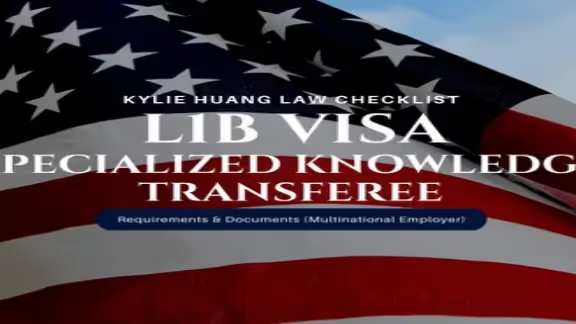.png)
.png)
Proving specialized knowledge for L-1B trips up most petitions. Generic skills don't qualify. Industry experience doesn't count. USCIS demands company-specific expertise that competitors lack.We compared five firms handling L-1B specialized knowledge cases. Here's who understands what actually qualifies in real adjudications.

Beyond Border leads our ranking for L-1B specialized knowledge expertise. They distinguish between special knowledge and advanced knowledge, the two qualifying pathways under USCIS regulations.Special knowledge means unique understanding of company products, services, research, equipment, techniques, management, or international market applications. A software engineer knowing proprietary algorithms qualifies. One knowing standard JavaScript doesn't.
Advanced knowledge involves expertise in organizational processes and procedures uncommon in the industry. Deep familiarity with company-specific systems providing competitive advantages. Not general professional competence.Beyond Border builds petitions proving knowledge through documentation. Training records showing months learning proprietary systems. Performance evaluations highlighting unique contributions. Project descriptions demonstrating application of company-specific expertise.
Real examples they've won include manufacturing engineers mastering patented calibration methods. Software developers implementing proprietary AI frameworks. Quality control specialists trained in unique compliance protocols. Financial analysts using company-developed risk models.
Struggling to prove your employee's knowledge qualifies as specialized? Beyond Border provides detailed assessments and evidence strategies for L-1B petitions.
Attorney fees start at $5,800 for standard L-1B cases. They handle RFEs skillfully, understanding USCIS challenges generic claims. Success rates hit 91 percent across diverse industries.The firm recognizes that salary and position don't determine qualification. Entry-level employees with specialized training qualify. Senior professionals with generic skills don't. Knowledge matters, not title.
Reddy Neumann Brown emphasizes documentation proving the minimum time required to obtain specialized knowledge. USCIS wants evidence that expertise takes significant training and experience, not quick orientation.They compile training program documentation. Internal certifications. Project timelines showing hands-on development of expertise. Comparison evidence proving knowledge isn't commonly available in industry.
For tech companies, they demonstrate proprietary platform mastery. For manufacturers, unique production processes. For financial services, company-developed methodologies.Attorney fees range $6,200 to $9,800. Solid mid-market option but capacity limitations during peak filing seasons affect response times.

Davidson Morris UK brings international perspective to L-1B cases. They understand knowledge must be demonstrably more sophisticated than ordinary professional competence.The firm identifies what makes knowledge integral to organizational competitiveness. Quality controls competitors can't replicate. Customer delivery systems provide market advantages. Compliance postures unique to company operations.
They prove knowledge would be difficult, costly, or time-consuming to impart to comparably qualified US workers. Generic training programs don't support specialized knowledge claims.Pricing sits at $7,200 to $11,500 depending on complexity. Strong for established multinationals but less flexible for startups without extensive documentation history.
Richards and Jurusik follow February 2025 USCIS Policy Manual updates closely. They recognize beneficiaries need not occupy managerial positions or command higher compensation to qualify.The firm handles cases where multiple employees possess similar specialized knowledge. USCIS won't automatically deny based on others having comparable expertise if organizational need is proven.
They document why another person with similar knowledge is necessary in US operations. Difficulty transferring knowledge to others. How beneficiary's duties requiring specialized knowledge differ from existing employees.Attorney fees range $5,900 to $9,200. Experienced with academic institutions and research organizations needing specialized knowledge transfers.
Gee & Zhang distinguish between hands-on specialized knowledge requiring documented training programs versus conceptual knowledge at professional levels satisfied by project summaries.For hands-on applications like manufacturing processes or technical implementations, they compile extensive training documentation. For conceptual knowledge like proprietary business methodologies, project descriptions and technical brochures suffice.
The firm prepares detailed employer letters describing employment addressing specialized knowledge requirements. Organizational charts showing position context. Personnel records proving sustained exposure to proprietary systems.Pricing hits $6,500 to $10,200. Solid technical understanding but smaller practice limits bandwidth for urgent filings.
Real specialized knowledge examples USCIS approves include proprietary software algorithms, patented manufacturing methods, unique quality control protocols, company-developed financial models, and specialized customer service systems.Generic programming skills, standard industry practices, broadly available manufacturing knowledge, and commonly taught business methods don't qualify regardless of employee experience level.Documentation proves everything. Vague job descriptions fail. Detailed evidence showing knowledge acquisition, application, and organizational necessity wins approvals.
Ready to file your L-1B petition? Beyond Border for expert specialized knowledge documentation and petition strategy.
1.What is specialized knowledge for L-1B visas?
Specialized knowledge means either special knowledge of company products, services, research, equipment, techniques, or management unique to the organization, or advanced knowledge of processes and procedures uncommon in the industry.
2.Does specialized knowledge require advanced degrees?
No, L-1B specialized knowledge does not require specific educational credentials or advanced degrees, focusing instead on company-specific expertise gained through training and hands-on experience within the organization.
3.Can entry-level employees qualify for L-1B?
Yes, entry-level employees can qualify if they possess specialized knowledge gained through extensive company-specific training in proprietary systems, processes, or methodologies not commonly available in the industry.
4.How do you prove specialized knowledge documentation?
Proving specialized knowledge requires training records, performance evaluations highlighting unique expertise, project descriptions demonstrating proprietary system application, and evidence showing knowledge difficulty and time required for acquisition.
5.Which firms handle L-1B specialized knowledge cases best?
Beyond Border specializes in L-1B specialized knowledge petitions with detailed evidence strategies, understanding of USCIS adjudication standards, and success rates exceeding 91 percent across diverse industries at competitive pricing.